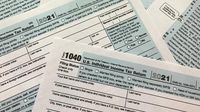Tax Day 2025 has arrived, marking April 15 as the final deadline for taxpayers in the United States to file their federal income tax returns. While many scramble to meet this deadline, it's crucial to understand the options available for those who need more time or have been impacted by recent disasters.
For most taxpayers, federal taxes are due by Tuesday, April 15, 2025. However, if you're not ready to file your return, you can request an extension. The Internal Revenue Service (IRS) allows taxpayers to file for an extension, providing an additional six months to complete their tax returns, pushing the deadline to October 15, 2025. Yet, it's important to note that this extension is solely for filing your return; any taxes owed must still be paid by April 15 to avoid penalties and interest.
According to the IRS, "An extension gives extra time to file, but it does not give taxpayers extra time to pay if they owe." This means that even if you file for an extension, you should estimate and pay any taxes due by the original deadline.
For taxpayers in California, there are specific provisions in place due to the wildfires that affected the state earlier this year. Residents and businesses in Los Angeles County impacted by these disasters have been granted an automatic extension to file and pay taxes until October 15, 2025. The IRS has identified these taxpayers and applied filing and payment relief accordingly.
Taxpayers across the nation can request an extension in several ways. One of the easiest methods is to use the IRS Free File option, which allows you to request an extension electronically. Alternatively, taxpayers can file a paper request using Form 4868, which is also accepted by the IRS. Regardless of the method chosen, it’s vital to ensure that any owed taxes are paid by April 15.
In Iowa, taxpayers have more time to complete their state income tax returns. While federal taxes are due by April 15, Iowans have until April 30, 2025, to submit their state income tax returns. If they have paid at least 90% of their tax liability by that date, they can extend their filing deadline to October 31, 2025.
Those who miss the tax deadline face penalties. The standard penalty for not filing on time is 5% of any tax due for each month the return is late, capped at 25% of the unpaid balance. If taxes owed are not paid when filing or when an extension is requested, a monthly penalty of 0.5% of the unpaid amount will also be charged.
Historically, the deadline for filing taxes has shifted. The Tax Day deadline was moved from March 15 to April 15 in 1955, allowing more time for taxpayers and the IRS to process increasingly complex returns. Today, the IRS processes a staggering number of returns each year, with over 144 million individual tax returns filed in 2024, and more than 96% submitted electronically.
As of April 4, 2025, the IRS had processed over 100 million returns and issued more than 67.7 million federal income tax refunds, with the average refund amounting to approximately $3,116. These figures highlight the ongoing reliance on electronic filing, which expedites the refund process significantly compared to paper returns.
For those who have filed their returns electronically and opted for direct deposit, refunds are typically issued within 21 days. For those who mail paper returns, the process can take longer, often requiring up to three months for state refunds, as noted by the California Franchise Tax Board.
Taxpayers can check the status of their refunds through the IRS website. For federal refunds, the status can be checked 24 hours after e-filing a current-year return, or 3-4 days after e-filing a prior-year return. For paper returns, taxpayers should wait about four weeks before checking the status.
In Michigan, the Treasury Department also allows taxpayers to request extensions. However, similar to federal guidelines, taxpayers are reminded that an extension to file does not extend the time to pay. Taxpayers expecting refunds may not need to file for an extension, as they can claim their refunds up to four years from the original due date without incurring penalties.
As Tax Day approaches, many taxpayers reflect on their financial situations from the past year. With the added pressures of recent severe weather in some states, the IRS has accommodated victims by extending deadlines. States like Tennessee, Arkansas, and Kentucky also provide automatic extensions for residents affected by natural disasters.
For those who are still unsure about their filing status or how to proceed, the IRS offers various resources, including free tax help for eligible individuals. Taxpayers can take advantage of no-cost options through IRS-certified volunteers or use online tools to file their taxes for free if their adjusted gross income is $84,000 or less.
As the clock ticks down to midnight on April 15, 2025, taxpayers across the nation are urged to ensure they have either filed their returns or requested extensions appropriately. The IRS emphasizes that proper planning and timely payments can help avoid unnecessary penalties and interest.
In summary, the deadline to file federal taxes is April 15, 2025, with extensions available until October 15 for those who request them. However, payments must still be made by the original deadline to avoid additional costs. Whether filing electronically or by mail, it's essential to stay informed and prepared during this busy tax season.








